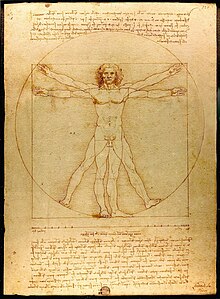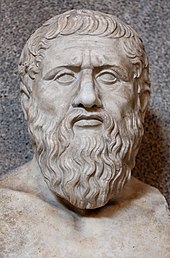

Western culture, also known as Western civilization, European civilization, Occidental culture, or Western society, refers to the diverse culture of the Western World. The term "Western" encompasses the social norms, ethical values, traditional customs, belief systems, political systems, artifacts and technologies primarily rooted in European and Mediterranean histories. A broad concept, "Western culture" does not relate to a region with fixed members or geographical confines. It generally refers to the classical era cultures of Ancient Greece and Ancient Rome that expanded across the Mediterranean basin and Europe, and later circulated around the world predominantly through colonization and globalization.[1]
Historically, scholars have closely associated the idea of Western culture with the classical era of Greco-Roman antiquity.[2][3] However, scholars also acknowledge that other ancient cultures, like Ancient Egypt, the Phoenician city-states, and several Near-Eastern cultures stimulated and fostered Western civilization.[4][5][6] The Hellenistic period also promoted syncretism, blending Greek, Roman, and Jewish cultures. Major advances in literature, engineering, and science shaped the Hellenistic Jewish culture from which the earliest Christians and the Greek New Testament emerged.[7][8][9] The eventual Christianization of Europe in late-antiquity would ensure that Christianity, particularly the Catholic Church, remained a dominant force in Western culture for many centuries to follow.[10][11][12]
Western culture continued to develop during the Middle Ages as reforms triggered by the medieval renaissances, the influence of the Islamic world via Al-Andalus and Sicily (including the transfer of technology from the East, and Latin translations of Arabic texts on science and philosophy by Greek and Hellenic-influenced Islamic philosophers),[13][14][15] and the Italian Renaissance as Greek scholars fleeing the fall of Constantinople brought ancient Greek and Roman texts back to central and western Europe.[16] Medieval Christianity is credited with creating the modern university,[17][18] the modern hospital system,[19] scientific economics,[20][21] and natural law (which would later influence the creation of international law).[22] European culture developed a complex range of philosophy, medieval scholasticism, mysticism and Christian and secular humanism, setting the stage for the Protestant Reformation in the 16th century, which fundamentally altered religious and political life. Led by figures like Martin Luther, Protestantism challenged the authority of the Catholic Church and promoted ideas of individual freedom and religious reform, paving the way for modern notions of personal responsibility and governance.[23][24][25][26]
The Enlightenment in the 17th and 18th centuries shifted focus to reason, science, and individual rights, influencing revolutions across Europe and the Americas and the development of modern democratic institutions. Enlightenment thinkers advanced ideals of political pluralism and empirical inquiry, which, together with the Industrial Revolution, transformed Western society. In the 19th and 20th centuries, the influence of Enlightenment rationalism continued with the rise of secularism and liberal democracy, while the Industrial Revolution fueled economic and technological growth. The expansion of rights movements and the decline of religious authority marked significant cultural shifts. Tendencies that have come to define modern Western societies include the concept of political pluralism, individualism, prominent subcultures or countercultures, and increasing cultural syncretism resulting from globalization and immigration.
- ^ Hanson, Victor Davis (2007). Carnage and Culture: Landmark Battles in the Rise to Western Power. Knopf Doubleday. ISBN 978-0-307-42518-8.
the term "Western" — refer to the culture of classical antiquity that arose in Greece and Rome; survived the collapse of the Roman Empire; spread to western and northern Europe; then during the great periods of exploration and colonization of the fifteenth through nineteenth centuries expanded to the Americas, Australia and areas of Asia and Africa; and now exercises global political, economic, cultural, and military power far greater than the size of its territory or population might otherwise suggest.
- ^
- Freeman, Charles (September 2000). The Greek Achievement: The Foundation of the Western World. Penguin. ISBN 978-0-14-029323-4.
The Greeks provided the chromosomes of Western civilization. One does not have to idealize the Greeks to sustain that point. Greek ways of exploring the cosmos, defining the problems of knowledge (and what is meant by knowledge itself), creating the language in which such problems are explored, representing the physical world and human society in the arts, defining the nature of value, describing the past, still underlie the Western cultural tradition
- Cartledge, Paul (2002). The Greeks: A Portrait of Self and Others. Oxford University Press. ISBN 978-0-19-157783-3.
Greekness was identified with freedom-spiritual and social as well as political-and slavery was equated with being barbarian, [...] 'democracy' was a Greek invention (celebrating its 2,500th anniversary in 1993/4) [...] an ancient culture, that of the Greeks — is both a foundation stone of our own (Western) civilization and at the same time in key respects a deeply alien phenomenon.
- Pagden, Anthony (2008). Worlds at War: The 2,500 - Year Struggle Between East and West. Oxford University Press. ISBN 978-0-19-923743-2.
Had the Persians overrun all of mainland Greece, had they then transformed the Greek city-states into satrapies of the Persian Empire, had Greek democracy been snuffed out, there would have been no Greek theater, no Greek science, no Plato, no Aristotle, no Sophocles, no Aeschylus. The incredible burst of creative energy that took place during the fifth and fourth centuries B.C.E. and that laid the foundation for all of later Western civilization would never have happened. [...] in the years between 490 and 479 B.C.E., the entire future of the Western world hung precariously in the balance
- Freeman, Charles (September 2000). The Greek Achievement: The Foundation of the Western World. Penguin. ISBN 978-0-14-029323-4.
- ^
- Richard, Carl J. (16 April 2010). Why We're All Romans: The Roman Contribution to the Western World. Rowman & Littlefield. ISBN 978-0-7425-6780-1.
In 1,200 years the tiny village of Rome established a republic, conquered all of the Mediterranean basin and western Europe, lost its republic, and finally, surrendered its empire. In the process the Romans laid the foundation of Western civilization. [...] The pragmatic Romans brought Greek and Hebrew ideas down to earth, modified them, and transmitted them throughout western Europe. [...] Roman law remains the basis for the legal codes of most western European and Latin American countries — Even in English-speaking countries, where common law prevails, Roman law has exerted substantial influence
- Sharon, Moshe (2004). Studies in Modern Religions, Religious Movements and the Båabåi-Bahåa'åi Faiths. Brill. ISBN 978-90-04-13904-6.
Side by side with Christianity, the classical Greco-Roman world forms the sound foundation of Western civilization. Greek philosophy is also the origin for the methods and contents of the philosophical thought and theological investigation in Islam and Judaism
- Grant, Michael (1991). The Founders of the Western World: A History of Greece and Rome. Scribner. ISBN 978-0-684-19303-8 – via Internet Archive.
- Perry, Marvin; Chase, Myrna; Jacob, James; Jacob, Margaret; Laue, Theodore H. Von (2012). Western Civilization: Since 1400. Cengage. ISBN 978-1-111-83169-1.
- Richard, Carl J. (16 April 2010). Why We're All Romans: The Roman Contribution to the Western World. Rowman & Littlefield. ISBN 978-0-7425-6780-1.
- ^ Nightingale, Andrea (2007). "The Philosophers in Archaic Greek Culture". In Shapiro, H. A.; Antonaccio, Carla M. (eds.). The Cambridge Companion to Archaic Greece. Cambridge companions to the ancient world. Cambridge University Press. p. 171. ISBN 978-0-521-52929-7.
We have ample evidence that the Greek thinkers encountered and responded to many different cultures and ideologies. Consider, for example, the city of Miletus, which was the center of intellectual activity in sixth-century Ionia. Miletus bordered on the Lydian and, later, the Persian empires and had extensive dealings with these cultures.In addition, it had trading relations all over the Mediterranean and sent out numerous colonies to Egypt and Thrace. The Milesian thinkers thus encountered ideas and practices from all over the "known" world. In the Archaic period, the interaction of different peoples from Greece, Italy, Egypt, and the Near East created a cultural ferment that had a profound impact on Greek life and thought.
- ^ Boardman, John (1982), Boardman, John; Hammond, N. G. L. (eds.), "The material culture of Archaic Greece", The Cambridge Ancient History, The Cambridge Ancient History, vol. 3 (2nd ed.), Cambridge University Press, p. 450, doi:10.1017/chol9780521234474.018, ISBN 978-0-521-23447-4, retrieved 20 October 2024,
Knowledge of Egyptian art after the mid century led to Greek exploitation of the harder stone, their white island marble, for the first time, and the creation of figures at life size or more. We know these best—the kouroi and korai—as dedications and grave markers, but a prime use for monumental statuary must have been as cult images and it is at about this time that the temple-houses, oikoi, for these images begin to receive a monumental form and, again probably through inspiration from Egypt are decorated with architectural orders: first the Doric in homeland Greece, then the orientalizing Ionic in the East Greek world.
- ^ Scott, John C (2018). "The Phoenicians and the Formation of the Western World". Comparative Civilizations Review. 78 (78). Brigham Young University. ISSN 0733-4540.
- ^ Green, P. (2008). Alexander The Great and the Hellenistic Age. Phoenix. p. xiii. ISBN 978-0-7538-2413-9.
- ^ Porter, Stanley E. (2013). Early Christianity in its Hellenistic context. Volume 2, Christian origins and Hellenistic Judaism: social and literary contexts for the New Testament. Leiden: Brill. ISBN 978-9004234765.
- ^ Hengel, Martin (2003). Judaism and Hellenism: studies in their encounter in Palestine during the early Hellenistic period. Eugene, OR: Wipf & Stock. ISBN 978-1-59244-186-0.
- ^ Spielvogel, Jackson J. (2016). Western Civilization: A Brief History, Volume I: To 1715 (Cengage Learning ed.). Cengage Learning. p. 156. ISBN 978-1-305-63347-6.
- ^ Neill, Thomas Patrick (1957). Readings in the History of Western Civilization, Volume 2 (Newman Press ed.). p. 224.
- ^ O'Collins, Gerald; Farrugia, Maria (2003). Catholicism: The Story of Catholic Christianity. Oxford University Press. p. v. ISBN 978-0-19-925995-3.
- ^ Cite error: The named reference
Haskinswas invoked but never defined (see the help page). - ^ Cite error: The named reference
Sartonwas invoked but never defined (see the help page). - ^ Cite error: The named reference
Burnettwas invoked but never defined (see the help page). - ^ Geanakoplos, Deno John (1989). Constantinople and the West : essays on the late Byzantine (Palaeologan) and Italian Renaissances and the Byzantine and Roman churches. Madison, Wis.: University of Wisconsin Press. ISBN 0-299-11880-0. OCLC 19353503.
- ^ Rüegg, Walter: "Foreword. The University as a European Institution", in: A History of the University in Europe. Vol. 1: Universities in the Middle Ages, Cambridge University Press, 1992, ISBN 0-521-36105-2, pp. xix–xx
- ^ Verger 1999
- ^ Risse, Guenter B. (April 1999). Mending Bodies, Saving Souls: A History of Hospitals. Oxford University Press. p. 59. ISBN 978-0-19-505523-8.
- ^ Schumpeter, Joseph (1954). History of Economic Analysis. London: Allen & Unwin.
- ^ "Review of How the Catholic Church Built Western Civilization by Thomas Woods, Jr". National Review Book Service. Archived from the original on 22 August 2006. Retrieved 16 September 2006.
- ^ Cf. Jeremy Waldron (2002), God, Locke, and Equality: Christian Foundations in Locke's Political Thought, Cambridge University Press, Cambridge (UK), ISBN 978-0-521-89057-1, pp. 189, 208
- ^ The Protestant Heritage Archived 23 February 2018 at the Wayback Machine, Britannica
- ^ McNeill, William H. (2010). History of Western Civilization: A Handbook (University of Chicago Press ed.). University of Chicago Press. p. 204. ISBN 978-0-226-56162-2.
- ^ Faltin, Lucia; Melanie J. Wright (2007). The Religious Roots of Contemporary European Identity (A&C Black ed.). A&C Black. p. 83. ISBN 978-0-8264-9482-5.
- ^ Karl Heussi, Kompendium der Kirchengeschichte, 11. Auflage (1956), Tübingen (Germany), pp. 317–319, 325–326